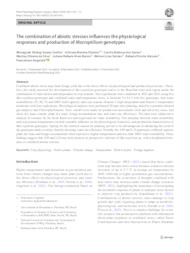The combination of abiotic stresses influences the physiological responses and production of Macroptilium genotypes.
The combination of abiotic stresses influences the physiological responses and production of Macroptilium genotypes.
Author(s): COELHO, W. A. A.; OLIVEIRAM G. M.; SANTOS, C. B. dos; SILVA, W. O. da; BARROS, J. R. A.; SIMOES, W. L.; ANTONIO, R. P.; ANGELOTTI, F.
Summary: Combined abiotic stress may harm forage yield due to the direct effects on physiological and production processes. There fore, this study assessed the development of Macroptilium genotypes native to the Brazilian semi-arid region under the combination of water deficit and temperature in crop seasons. The experiments were conducted in 2021 and 2022, using five Macroptilium genotypes and combined water and temperature stress, in factorial 5 × 4 × 2 with five genotypes, four water availabilities (25, 50, 75, and 100% field capacity) and crop seasons (Season 1–high temperature and Season 2–temperature moderate) with four replications. Physiological analyses were performed 30 days after planting, aided by a portable infrared gas analyzer and Chlorophyllometer. Next, cutoffs were made for production assessments (leaf and shoot dry mass, leaf shoot dry mass content, plant dry mass, forage accumulation rate, and water use efficiency). The data were subjected to analysis of variance by the Scott-Knott test and regression for water availability. The interplay between water availability and crop season temperatures exerted a notable influence on the physiological, biometric, and production characteristics of Macroptilium genotypes. Opting for the warmest season for planting proved to be advantageous in enhancing the yield of the genotypes under scrutiny, thereby elevating water use efficiency. Notably, the A59 and L34 genotypes exhibited superior plant dry mass and forage accumulation when exposed to higher temperatures and less than 100% water availability. These findings suggest that A59 and L34 may hold promise as prospective cultivars of Macroptilium sp. with a heightened tolerance to combined abiotic stresses.
Publication year: 2024
Types of publication: Journal article
Unit: Embrapa Semi-arid Region
Observation
Some of Embrapa's publications are published as ePub files. To read them, use or download one of the following free software options to your computer or mobile device. Android: Google Play Books; IOS: iBooks; Windows and Linux: Calibre.
Access other publications
Access the Agricultural Research Database (BDPA) to consult Embrapa's full library collection and records.
Visit Embrapa Bookstore to purchase books and other publications sold by Embrapa.

